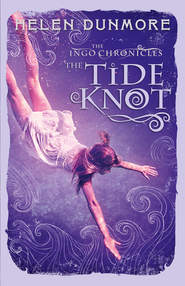По всем вопросам обращайтесь на: info@litportal.ru
(©) 2003-2024.
✖
Stormswept
Настройки чтения
Размер шрифта
Высота строк
Поля
But one night everything changed. The hall was packed with people. There was a great gathering, with music that was going to play all night long. There were fiddles and bodhrans, bagpipes, whistles and harps. The music flooded out, and in spite of the crowd everybody was dancing. All you could hear was the skirl of the band and the stamp of hundreds of feet.
That’s why nobody heard the change in the wind. It had been blowing a gale all day, but our ancestors were used to gales and bad weather, just as we are. They didn’t let it stop their celebrations. The wind grew louder and louder, louder than any wind that had ever been heard in that land. It roared around the roof like an express train, and as it blew the sea began to move.
It moved slowly and stealthily at first, as if it didn’t want to alarm anyone. Only one person saw what was happening, and that was a boy who was perched up on his father’s shoulders so that he could see everything. The windows were high up in the walls and only the boy could look out of them. He turned, just as the moon broke free of the raging clouds and shone out. The boy saw the wild, foaming waves flatten as if a giant hand were pressing down on them. And then, very slowly the sea began to move backwards, as if it were swilling away down a giant plughole.
The boy blinked. He couldn’t believe what he was seeing.
“Dad! Dad!“ he shouted. “The sea’s going backwards!”But his father didn’t hear him above the noise in the hall. The boy stared with his mouth open. In the far distance, where the sea had gone, he saw a wall of water, higher than any wave he had ever surfed, higher than any house, far higher than the walls of the great hall. It was as black as night with a crest of curling foam. It was moving, but not backwards now. It was coming in towards the land.
The boy cried out, so loud that this time his voice was heard above all the noise in the hall:
“The sea! The sea’s coming!”
People close by frowned at him for screaming like that. The band kept on playing, but one man heard the terror in the boy’s voice, and he went to the doors at the back of the hall and pulled them open. Outside it was almost dark. The air streamed with spray until it was hard to see anything. But the moon shone out and then the man saw what the boy had seen: a wall of water advancing slowly but with terrifying force, as if nothing in the world could stop it. The hair on his scalp prickled. A cold wind roared through the hall from the open door. At the same moment the man’s voice rang out like a trumpet:
“The sea’s coming! Run for your lives!”
The fiddler stopped playing, with his elbow raised. Everyone stood frozen for a second and then a wave of panic rushed through the crowd. People began to shove towards the door, grabbing their children and their loved ones. Some clambered up to the windows and there was the crash of breaking glass, and then a scream. The blind fiddler held his fiddle high. Whatever happened, he would protect what was most precious to him. He couldn’t see what was happening but he could smell the panic and hear the cries of parents calling for their children:
“The sea’s coming! Cador, where are you? Tamasin! Tamasin!”
“The sea’s coming! We’ll be trapped!”
They’d lived with the sea all their lives. They knew all about storms, but this they had never seen. Those at the back of the hall could see the wall of water rushing towards them, reaching for them, as they fought to get out of the doors.
The boy on his father’s shoulders saw the blind fiddler holding his fiddle high. He bent down and shouted into his father’s ear above the roar of the water and the screams and cries:
“Father! We must help him! He can’t find the door!”
In a few strides the boy’s father made his way along the wall, away from the crowd pressing towards the doors. The jam of people was too dangerous now, the father judged. His boy would be crushed. He would try to get the boy to safety another way, and the blind fiddler, if he would come with them.
They begged the fiddler to follow them, but he refused.
“You’ve got your young one,” he said. “Take my fiddle and run for the highest ground.”
The blind man put his fiddle into the boy’s arms, and the boy held it high. The father climbed on a chair, smashed a window and knocked out the glass with his boot. He lifted his boy high, still holding the fiddle, and put him up on the window ledge. The boy clung to the stone frame. Outside it was dark and the ground was a long way down.
“Jump!” he said. “Jump! I’m coming after you!”
The boy jumped. He landed on his feet then stumbled and fell on one knee, but still he held the fiddle safe. He looked up for his father, but his father shouted, “Run! Run, Conan! I’m coming after you! Run for the highest ground! I’ll be right behind you! Run!”
The boy obeyed his father, and ran. He could hear the gathering roar of the sea, and ahead of him he could see the shadow of the Castle Mound, which was the highest place for miles. He held the fiddle in his arms and ran until his breath burned in his lungs, and his heart was pounding. The sea was behind him. He didn’t dare to turn. It was like a wild animal, roaring at his heels. In front of him the bulk of the Mound grew clearer. He was almost there. Just a few more breaths, just a few more desperate pounding steps. His feet were on the rock. He was stumbling, falling, with the fiddle held high above his head to keep it clear of the water. At that moment an arm reached out and dragged him up on to the rock, and held him tight. He was safe on the Mound.
But where was his father? He looked behind him and saw the wall of water below him. In the moonlight he saw hundreds of figures running for their lives, but the water was gaining on them. His father had no one to lift him up to the window frame! How would he escape? Conan cried out in horror as he realised the sacrifice his father had made. He thrust the blind man’s fiddle into the arms of a woman who was shivering beside him.
“Keep it safe!” he shouted, and he turned and plunged back downhill.
The wall of water broke long before it reached the boy. Its force swelled over the city and swept away everyone in its path. The great hall filled with salt water, and out of all the people who had played and danced that night, only a handful ever reached the safety of the Mound. The power of the water spread out over the land, covering it, turning miles of fertile fields and a great city into a bay full of raging sea. The water boiled with wreckage. The air was filled with sobs and cries and curses, as the people of the city gave up their lives.
But the boy was still alive. The water seized him, hurled him high into the air, and then plunged him down into its depths. His lungs were bursting but he kicked and fought his way back to the surface. All his experience of growing up by the sea came to his aid as the currents of the storm clawed at him.
“Don’t panic,” Conan told himself. “Don’t fight the current, go with it until you can swim across it.”
Everywhere around him there was blackness. Cloud had come over the moon and Conan couldn’t even see where the great hall had been. He shouted again and again for his father, as he struggled to keep afloat. No one answered. Salt water filled his mouth and he coughed and spat and choked. The sea was too strong. It had got hold of him and it wasn’t going to let him go. Bright speckles danced in the blackness in front of his eyes and he remembered his father’s words,
“You only have to make one mistake, Conan, because the sea never makes any.”
Another wave broke over his head, pushing him down.
At that moment a strong arm came around him. Conan was rising up to the surface again. There was air and he could breathe. Someone was holding him up, holding him so strongly that the sea had no power to pull him away.
They were swimming across the current now, more powerfully than the boy had ever swum in his life. The waves were calming, and the moon had once more pushed the clouds aside. Ahead of him, Conan saw the Mound rising against the sky. At that moment the grip on him loosened. The boy turned and saw a face he didn’t know, with long hair streaming around it like seaweed. It was not his father who had saved him. The man pointed ahead, as if showing Conan the way he must go to safety. Land was very close. The boy trod water, and then his foot brushed against sand. Coughing and choking, the boy dragged himself into the shallows and lay there gasping for breath.
When he looked up, the man who had helped him had disappeared.
Conan never saw his father again. The other survivors became his family. As dawn broke they huddled together on the Mound, with the wide, grey, stormy sea all around them. Castle Mound had become an island. Their city and their homes had vanished beneath the waves. The survivors had no possessions, except for the clothes they were wearing and the blind man’s fiddle. But they had their lives, to start all over again, and they had their memories.
They remembered the music they used to play. As time went on they got other instruments from the mainland: bodhrans, flutes, bagpipes. They played the music of the lost city, even though it made them sad at first. They remembered what their lives had been like, and they built a new community, and a future for themselves and for their children, on the Island. Conan grew up, and became a great fiddle player. People said that he played almost as well as the blind fiddler who drowned in the flood.
Conan never forgot the arm that had reached out from the water and brought him safe to land. No human arm could have had the strength to hold him against that wall of water. No human being could have swum against the current and brought him to the Island.
Years later, when Conan had children and grandchildren of his own, he passed down to them the story of his rescue. He wanted it to be remembered for ever, and it is. I remember it, Jenna and Digory remember it. Our parents told us the story just as their parents told it to them, and back and back for as long as anyone knows. Conan is my ancestor. My great-great-great-great… I don’t know how many greats. He always kept the blind man’s fiddle safe, and we have it safe still. We call it Conan’s fiddle.
When Digory is old enough for a full-sized fiddle, that’s the one he will play. It’s too big for him now. Sometimes he takes it out of its case, just to try it, and to stroke the rich curve of the wood. Maybe some of the blind fiddler’s spirit has stayed in his instrument, because Digory says it is full of music. If anyone can find that music, Digory can. After a while we wrap the fiddle again in its blue velvet cloth, and put it back in the case. Some people say that if the fiddle is ever lost or broken, it will be the end of our island, and we should keep it stored away somewhere safe and never play it. Mum says that is rubbish. Fiddles are for playing, just as life is for living.
There is another legend about our ancestors, but it sounds so weird that not many people even talk about it, let alone believe it. They think it’s just a story that was made up to comfort the survivors, after the flood. But I’m not so sure… Maybe I believe it because Conan is my ancestor, and he was saved by a man with long hair like seaweed and the power to swim where no human being would be able to swim.
This is the legend. They say that when the wall of water swept away all those hundreds of people, not all of them drowned, even though they went down and down into the water, so far that they couldn’t rise again. A few of them – a very few – survived. Their lungs were bursting and burning for air. They couldn’t hold out against the water any longer and there wasn’t a chance of getting back to the surface. They had to breathe in.
They did breathe in. Seawater filled their lungs and salt swept through every vein in their bodies. They should have died but the sea didn’t kill them. They were filled with agony at the first breath of salt water, but then they took a second breath, and a third. Each time, their breathing grew easier. Their bodies took in the sea and became part of the sea, and they didn’t die.
It’s only a legend. Nobody ever saw one of those people who had been changed so that they could live in the sea. They could never come back, because they belonged to the sea now. Their skin changed until it looked like the skin of a seal, not the skin of a human being. They could swim as far and as fast as dolphins. They had their own language, and their own world.
Once Jago Faraday was out in his boat, night-fishing, over the place where the drowned city is said to be. It was a calm night and the sea was flat. There wasn’t a breath of wind. Jago dropped his anchor, and as he did so he looked down into the depths of the water. He saw shadows moving far below the surface.
“Shoal of mackerel, most likely,” said the men in the pub, as he told his story.
“Shoal of mackerel never looked like that,” Jago answered.
“A seal then.”
“Think I don’t know a seal when I see him?”
“Maybe it was that good old Tribute you been drinking, Jago.”
Jago scowled even more.
“I was stone-cold sober as I stand now,” he growled. “I saw shadows and I heard music. Had to turn on the engine so I wouldn’t hear it no more.”











